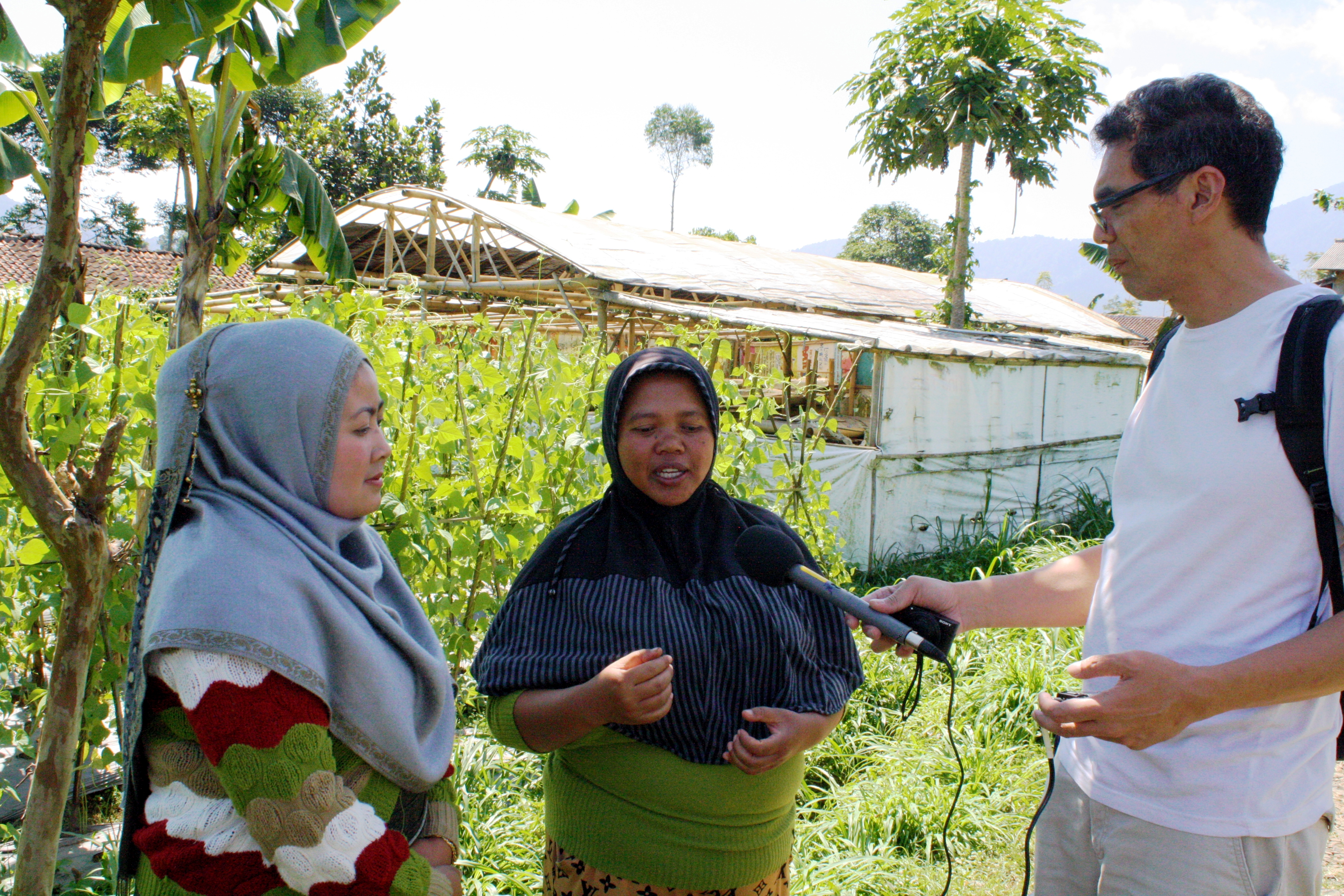
After travelling for approximately one hour, we finally arrived in the location, that is Kampung Areng, Desa Cibodas, Lembang, West Java. Upon arrival in the location, the media journalist whose home based is in London immediately showed his interest. Following the guidance, Ging immediately headed toward the Domestic Biogas (BIRU) belonging to Mrs. Eti (38). He asked several questions regarding the BIRU biogas utilization and its daily use. Through a descriptive interview with Mrs. Eti and supported by the explanation of BIRU quality inspector of West Java province, we managed to retrieve various information. Based on such explanation, biogas is used daily to cook using a biogas-fueled stoves hence there is no need to rely on LPG anymore. Normally, this mother of three children, consumes four tanks of LPG for her daily needs. Following her migration to BIRU biogas during the last four year, she has not bought any LPG at all. Additionally, she also managed to generate a solid bio-slurry for fertilizing her field crops. Meanwhile, she uses the liquid bio-slurry to water her plants. Ging spent quite some time in Mrs. Eti’s residence. In addition to the interview, he also took several pictures of reactors and biogas stoves for his article sources.
As afternoon time approaches, Ging headed to the home of the second user which is situated nearby. As he observed the surrounding area, he entered into a green house, a place belonging to Mrs. Nina (30) which she uses to raise her worms. BIRU biogas’ second user is a farmer and at the same time is also a worm breeder. He is no longer reluctant to interview her. Mrs. Nina passionately explained in details on how her worm farm is run using her own biogas facility. She explained that BIRU helped her in a great deal by driving the productivity level of her bred worms. She distributes her worm products to pharmacy and cosmetic industries. Other than using the bio-slurry for her worm farm, Mrs. Nina also uses the bio-slurry for her farms. Her horticulture products inlcude among other tomatoes and broccoli.
Upon concluding the interview with Mrs. Nina, Ging observed the surrounding vast landscape of tomatoes and brocolli plants amidst other plants. Immediately he spotted several farmers who were fertilizing their plants. Without the slightest hesitation, he approached these farmers. Ging asked questions on what they were doing, and they immediately replied that they were fertilizing their plants using bio-slurry fertilizers. Once again, it aroused his interests to interview these farmers and at the same time he took several pictures for documentation purposes.
Karya Ibu Group
It turns out that biogas has numerous benefits for the surrounding communities of Kampung Areng. Mrs. Eti, for example, who utilizes the biogas and at the same time reaps the benefits of her bio-slurry production. She manages to reduce the use of chemical fertilizer and save one hundred thousand Rupiah. Now, her field which occcupies an area of 700 meter squares is planted with such plants as tomatoes, chilli plants, broccoli, and eggplants using bio-slurry as the fertilizers. According to her, bio-slurry enables her to apply an intercropping fertilizing model and thus drives her productivity level. She may also distribute the fertilizers generated by the bio-slurry to the market in the form of composted fertilizer, and even combine it with the worms to produce a new form of fertilizers known locally as Kascing fertilizer (that is a fertilizer in which one of the composition is the worms’ excrement. The total production of the fertilizers amounted to 30 kilograms and sold at Rp 25,000. This is an additional stream of income for the family. Meanwhile, Mrs. Nina has her own story as the worm breeder. Other than utilizing the bio-slurry for her farms, she also utitilizes the bio-slurry for the worm farm. During the harvesting time, it may yield a 100 kilograms of worms at a price of Rp 25,000 per kilogram.
The exciting part during the coverage visit of the BBC Indonesia journalist to Kampung Areng, Lembang, West Java is on the existence of Karya Ibu farmer and livestrock breeder group. BIRU has indirectly contributes to the formation of this community in the surrounding area of Kampung Areng. Many farmers and livestock breeder enjoyed numerous benefits of biogas upon the introduction of BIRU program. However, many of them simply do not understand on how to utilize and sell the products. Women in Kampung Areng then took the initiative to form this Karya Ibu community. As of now, thirty people have joined the community while the active members are fifteen people. The purpose of forming this Karya Ibu group is to access facilities and waste processing and access to quick sales. Additionally, the group which was founded back in 2012 has also expanded their businesses to producing and selling the snacks. They have even organized a training for women in the area who were idle, due to a recent maternity as well as taking care their children, to enable them to produce the snacks.
The afternoon time has started to wear on. It was already three o’clock in the afternoon. We decided to return to Jakarta with all the outcomes we have intended to attain. Indeed it is an exciting lesson from a farmer and livestock breeder group who managed to turn waste products into a benefit. (AA).


